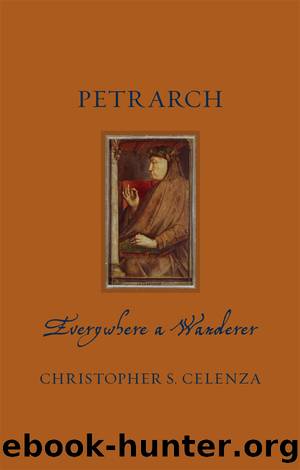Petrarch by Christopher S. Celenza

Author:Christopher S. Celenza [Celenza, Christopher S.]
Language: eng
Format: epub
Tags: Biography & Autobiography, Literary Figures, History, General, Europe, Italy, Renaissance
ISBN: 9781780238388
Google: AqYsEAAAQBAJ
Publisher: Reaktion Books
Published: 2017-12-15T22:15:46+00:00
What then should I do? Should I just abandon my projects, after having interrupted them? Or should I instead, speed them up and, with Godâs blessing, finish them so that, relieved of these concerns I might proceed with greater exposition to more important matters?78
Augustineâs answer, finally, is twofold and simple: âCast off the weighty shackles of your historical work. The deeds of the Romans and their consequent fame have been amply illustrated by the talents of others.â Second and more probingly, Augustine continues: âPut Africa aside, and leave it to those who possess it. Youâll gain glory neither for Scipio nor for yourself: he cannot be praised any more highly, and youâll just struggle along after him on a side street.â79 Dimitte Africam: âPut Africa aside.â This was the epic Petrarch had been inspired to write as he dreamed of his laurel crown, on which he continued to work after receiving it, and with which he was still, at the time of his Secret, preoccupied. The rest of the dialogue has some more back and forth, but the two injunctions regarding On Illustrious Men and the Africa represent the core of the interlocutor Augustineâs message to the interlocutor Petrarch. And, of course, they emblematize Petrarchâs own struggle.
The dialogue ends with Petrarch still in a state of ambivalence. Admitting that Augustineâs advice â to leave his work behind and work instead on his own soul â is the right thing to do, Petrarch says that, though he would like to do so, âI am unable to refrain my desire.â80 Augustine responds: âWe are falling back into our old debate â you designate the will as powerless,â meaning that Petrarch in Augustineâs estimation is abdicating control over his will and that, if he really wanted to do so, he could indeed pursue the path Augustine has outlined for him.81 Again, we have a representation of Augustine that is only that, a representation, as Augustine himself was acutely conscious of the weakness of the human will. But Petrarch is not trying to offer a systematic account of Augustineâs thoughts on the human will. Instead Petrarch is projecting one side of his personality and one part of his interior conflicts onto the page. The two sides would always be there for him, always a part of who he was: interior versus exterior, contemplative versus active, a man in retreat versus a man on the move.
And on the move he was. After drafting his Secret, surviving the plague, outliving the real biographical Laura (even if her image remained ever with him) and, finally, surveying the remains of his life in France, he made the momentous decision to move to Italy, something he did definitively in 1353. Offered patronage by the archbishop of Milan, Giovanni Visconti (1290â1354), Petrarch decamped for Milan. A metrical letter he composed gives us a sense of his excitement:
Download
This site does not store any files on its server. We only index and link to content provided by other sites. Please contact the content providers to delete copyright contents if any and email us, we'll remove relevant links or contents immediately.
| Ancient & Classical | Arthurian Romance |
| Beat Generation | Feminist |
| Gothic & Romantic | LGBT |
| Medieval | Modern |
| Modernism | Postmodernism |
| Renaissance | Shakespeare |
| Surrealism | Victorian |
4 3 2 1: A Novel by Paul Auster(12354)
The handmaid's tale by Margaret Atwood(7727)
Giovanni's Room by James Baldwin(7301)
Asking the Right Questions: A Guide to Critical Thinking by M. Neil Browne & Stuart M. Keeley(5741)
Big Magic: Creative Living Beyond Fear by Elizabeth Gilbert(5725)
Ego Is the Enemy by Ryan Holiday(5392)
The Body: A Guide for Occupants by Bill Bryson(5065)
On Writing A Memoir of the Craft by Stephen King(4919)
Ken Follett - World without end by Ken Follett(4705)
Adulting by Kelly Williams Brown(4552)
Bluets by Maggie Nelson(4534)
Eat That Frog! by Brian Tracy(4499)
Guilty Pleasures by Laurell K Hamilton(4422)
The Poetry of Pablo Neruda by Pablo Neruda(4079)
Alive: The Story of the Andes Survivors by Piers Paul Read(4009)
White Noise - A Novel by Don DeLillo(3990)
Fingerprints of the Gods by Graham Hancock(3979)
The Book of Joy by Dalai Lama(3959)
The Bookshop by Penelope Fitzgerald(3827)
